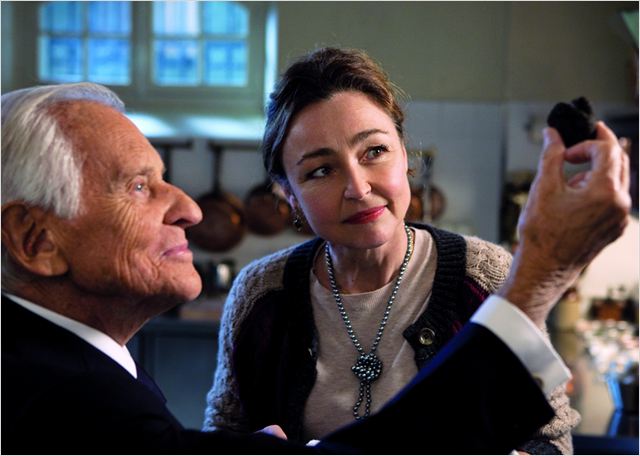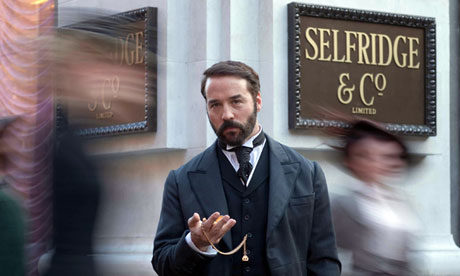New York is currently in the midst of the Tribeca Film Festival and theaters are brimming with high-quality cinematic entertainment. One spotlight film is Haute Cuisine, a delicious French film that will leave you both hungry and satisfied.
Haute Cuisine is a quasi-biopic about a woman who became French President Francois Mitterand's personal chef for two years. Catherine Frot plays Hortense Laborie, a woman who runs a small farm in the French countryside and established a culinary school for international chefs. However, one day she gets a call from some government officials and is whisked off to Elysee Palace, where the Chief of Staff tells her she has been selected to be the President's personal chef. She is bewildered but can't refuse the position; by the end of the week she has moved to Paris. Her first foray into the Palace kitchens reveal that it is a boys' club - there are no female chefs in sight and the Main Kitchen is predisposed to look down on anyone who works in the Private Kitchen. Faced with opposition from the very beginning, Hortense nonetheless sets out to change the way things are done and ensure that the President is served the best that French cuisine has to offer.
Hortense's love for food is evident in every frame. She is the only one in the hierarchy of public servants who dares to ask what kind of food the President actually likes to eat, as opposed to just blindly following the protocols and schedules that dictate the daily proceedings. Initially, her only source of information is the maitre d', who gives her copious notes on how the President ate his food and how clean his plate was at the end of every meal. After a few weeks of this roundabout intel-gathering, Hortense finally secures a meeting with the man himself, and they share a delightful conversation about recipe books, French home cooking, and the joys of truffles.
The movie goes back back and forth between Hortense's time in Paris and her current job as a chef at a scientific base at Antarctica. It's an odd juxtaposition and we are told from the very beginning that things didn't go well at Elysee Palace. The story unfolds slowly and amidst the comedy and deliciousness, there are also roadblocks and conflicts set up by the male chefs who resent Hortense's influence over the President's palate. As the government starts to interfere with her menus, Hortense finds herself longing for her old uncomplicated life.
 Haute Cuisine is the story of real-life chef Daniele Delpeuch, and while some elements of the story are imagined, the basic facts are still extraordinary and true. She was a formidable woman with a formidable job, and director Christian Vincent tells her story with relish. If you're in New York, you can queue up for rush tickets to watch this movie this week (details are here on the Tribeca website). So treat yourself to a delicious French film and never look at a truffle in the same way again.
Haute Cuisine is the story of real-life chef Daniele Delpeuch, and while some elements of the story are imagined, the basic facts are still extraordinary and true. She was a formidable woman with a formidable job, and director Christian Vincent tells her story with relish. If you're in New York, you can queue up for rush tickets to watch this movie this week (details are here on the Tribeca website). So treat yourself to a delicious French film and never look at a truffle in the same way again.
Haute Cuisine is a quasi-biopic about a woman who became French President Francois Mitterand's personal chef for two years. Catherine Frot plays Hortense Laborie, a woman who runs a small farm in the French countryside and established a culinary school for international chefs. However, one day she gets a call from some government officials and is whisked off to Elysee Palace, where the Chief of Staff tells her she has been selected to be the President's personal chef. She is bewildered but can't refuse the position; by the end of the week she has moved to Paris. Her first foray into the Palace kitchens reveal that it is a boys' club - there are no female chefs in sight and the Main Kitchen is predisposed to look down on anyone who works in the Private Kitchen. Faced with opposition from the very beginning, Hortense nonetheless sets out to change the way things are done and ensure that the President is served the best that French cuisine has to offer.
Hortense's love for food is evident in every frame. She is the only one in the hierarchy of public servants who dares to ask what kind of food the President actually likes to eat, as opposed to just blindly following the protocols and schedules that dictate the daily proceedings. Initially, her only source of information is the maitre d', who gives her copious notes on how the President ate his food and how clean his plate was at the end of every meal. After a few weeks of this roundabout intel-gathering, Hortense finally secures a meeting with the man himself, and they share a delightful conversation about recipe books, French home cooking, and the joys of truffles.
The movie goes back back and forth between Hortense's time in Paris and her current job as a chef at a scientific base at Antarctica. It's an odd juxtaposition and we are told from the very beginning that things didn't go well at Elysee Palace. The story unfolds slowly and amidst the comedy and deliciousness, there are also roadblocks and conflicts set up by the male chefs who resent Hortense's influence over the President's palate. As the government starts to interfere with her menus, Hortense finds herself longing for her old uncomplicated life.
 Haute Cuisine is the story of real-life chef Daniele Delpeuch, and while some elements of the story are imagined, the basic facts are still extraordinary and true. She was a formidable woman with a formidable job, and director Christian Vincent tells her story with relish. If you're in New York, you can queue up for rush tickets to watch this movie this week (details are here on the Tribeca website). So treat yourself to a delicious French film and never look at a truffle in the same way again.
Haute Cuisine is the story of real-life chef Daniele Delpeuch, and while some elements of the story are imagined, the basic facts are still extraordinary and true. She was a formidable woman with a formidable job, and director Christian Vincent tells her story with relish. If you're in New York, you can queue up for rush tickets to watch this movie this week (details are here on the Tribeca website). So treat yourself to a delicious French film and never look at a truffle in the same way again.
